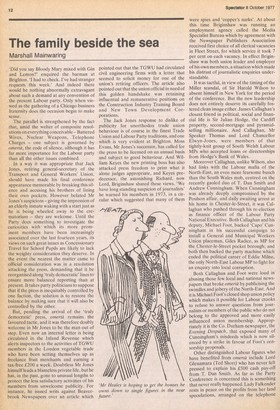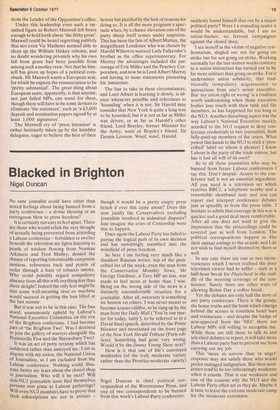The family beside the sea
Marshall Mainwaring
'Did you say Bloody Mary mixed with Gin and Lemon?' enquired the barman at Brighton. 'I had to check. I've had stranger requests this week.' And indeed there would be nothing abnormally extravagant about such a demand at any convention of the present Labour party. Only when viewed as the gathering of a Chicago business fraternity does the occasion begin to make sense.
The parallel is strengthened by the fact that, amid the welter of composite resolutions on everything conceivable — Battered Wives, Nuclear Weapons, Telephone Charges — one subject is governed by omerta, the code of silence, although it has far more importance for the Labour party than all the other issues combined.
In a way it was appropriate that Jack Jones, retiring general-secretary of the Transport and General Workers' Union, should have made his final conference appearance memorable by breaking this silence and accusing his brothers of lining their own pockets. However belated Mr Jones's suspicions — giving the impression of an elderly inmate waking with a start just as he is being wheeled away to the crematorium — they are welcome. Until the Party does something to investigate the curiosities with which its more prominent members have been increasingly associated over the last fourteen years, its views on such great issues as Concessionary Travel for School Pupils are likely to lack the weighty consideration they deserve. In the event the nearest the matter came to official consideration was in a resolution attacking the press, demanding that it be reorganised along 'truly democratic' lines to ensure more balanced reporting than at present. It takes party politicians to suppose that if the press is inequitably controlled by one faction, the solution is to restore the balance by making sure that it will also be controlled by the other.
But, pending the arrival of the 'truly democratic' press, omerta remains the favoured tactic, and it was therefore doubly welcome in Mr Jones to be the man out of step. Even now an internal letter is being circulated in the Inland Revenue which alerts inspectors to the activities of TGWU members in the London vegetable trade who have been setting themselves up as freelance fruit merchants and earning a tax-free £200 a week. Doubtless Mr Jones himself leads a blameless private life, but he has, in the past, gone to unusual lengths to protect the less satisfactory activities of his members from unwelcome publicity. For instance, he issued writs against Beaverbrook Newspapers over an article which pointed out that the TGWU had circulated civil engineering firms with a letter that seemed to solicit money for one of the union's retiring officers. The article also pointed out that the union official in need of this golden handshake was retaining influential and remunerative positions on the Construction Industry Training Board and New Town Development Corporations.
The Jack Jones response to dislike of publicity for unorthodox trade union behaviour is of course in the finest Trade Union and Labour Party traditions, and one which is very evident at Brighton. Moss Evans, Mr Jones's successor, has called for the press to be licensed on an annual basis and subject to good behaviour. And William Keyes the new printing boss has also attacked press freedom to print what it alone judges appropriate, and Keyes predecessor, the astonishing Richard, now Lord, Briginshaw shared these views. 'We have long standing suspicion of journalists' he warned his members in 1973, in a circular which suggested that many of them were spies and 'copper's narks'. At about this time Briginshaw was running an employment agency called the Media Specialist Bureau which by agreement with the Newspaper Publishers Association received first choice of all clerical vacancies in Fleet Street, for which service it took 7 per cent on each vacancy. In effect Briginshaw was both union leader and employer of his own members, a situation which made his distrust of journalistic enquiries understandable.
It was tactful, in view of the timing of the Miller scandal, of Sir Harold Wilson to absent himself in New York for the period of the conference. But the new leadership does not entirely deserve its carefully fos tered clean image either. James Callaghan's closest friend in political, social and financial life is Sir Julian Hodge, the Cardiff property, second-mortgage and pyramid selling millionaire. And Callaghan, Mr Speaker Thomas and Lord Chancellor Elwyn-Jones, were members of that tightly-knit group of South Welsh Labour MPs who accepted loans or directorships from Hodge's Bank of Wales.
Moreover Callaghan, unlike Wilson, also had links with the Labour mafia of the North-East, an even more fearsome bunch than the South Wales mob, centred on the recently gaoled duo of T. Dan Smith and Andrew Cunningham. When Cunningham was already deeply compromised by the Poulson affair, and daily awaiting arrest at his home in Chester-le-Street, it was Cal laghan who pushed through his re-election as finance officer of the Labour Party National Executive. Both Callaghan and his deputy, Michael Foot, backed `Capo' Cunningham in his successful campaign to install a General and Municipal Workers Union placeman, Giles Radice, as MP for the Chester-le-Street pocket borough; and both then backed the party machine which ended the political career of Eddie Milne, the only North-East Labour MP to fight for an enquiry into local corruption.
Both Callaghan and Foot were loud in abusing those few local and national news papers that broke omerta by publicising the swindles and jobery of the North-East. And it is Michael Foot's closed shop union policy which makes it possible for Labour crooks to refuse to answer questions from journalists or members 9f the public who do not belong to the approved and more easily influenced union membership. Appropriately it is the Co. Durham newspaper, the Evening Despatch, that exposed many of Cunningham's misdeeds which is now silenced by a strike in favour of Foot's censorship proposals.
Other distinguished Labour figures who have benefited from omerta include Lord Glenamara (Ted Short) who has never felt pressed to explain his. £500 cash pay-off from T. Dan Smith. As far as the Party Conference is concerned this is something that never really happened. Lady Falkender rests in peace on the profits from her land speculations, arranged on the telephone from the Leader of the Opposition's office.
Under this leadership even such a tarnished figure as Robert Maxwell felt brave enough to hold forth about 'the filthy press'. Maxwell could be heard regretting publicly that not even Vic Mathews seemed able to clean up the William Hickey column, and no doubt wondering privately why his own fall from grace had been possible from among such a motley crew. Not that he himself has given up hopes of a political comeback. Mr Maxwell wants a European seat, for which he expects the remuneration to be 'pretty substantial'. The great thing about European seats, apparently, is that anyone, not just failed MPs, can stand for them, though there will have to be some devices to eliminate 'the nuisances', such as 'a £3,000 deposit and nomination papers signed by at least 1,000 signatures'.
The Maxwell cry of 'press intrusion' is rather hesitantly taken up by the humbler delegates, eager to believe the best of their heroes but puzzled by the lack of reasons for doing so. It is all the more poignant a spectacle when, by a chance elevation one of the party sheep itself comes under suspicion. This has been the fate of Albert Murray, the insignificant Londoner who was chosen by Harold Wilson to succeed Lady Falkender's brother as the office supernumerary. For Murray the advantages included the patronage of Eric Miller and the Peachey Corporation, and now he is Lord Albert Murray and having to issue statements protesting his innocence.
The line to take in these circumstances, and Lord Albert is learning it slowly, is silence whenever possible and references to 'hounding' when it is not. Sir Harold may consider that New York is quite a long way to be hounded; but it is not as far as Miller was driven, or as far as Harold's other friend, Lord Brayley, former Minister for the Army, went or Brayley's friend, Sir Dennis Lowson. Woof, woof, Harold.



































 Previous page
Previous page